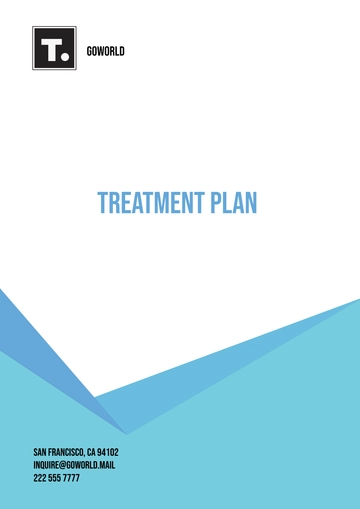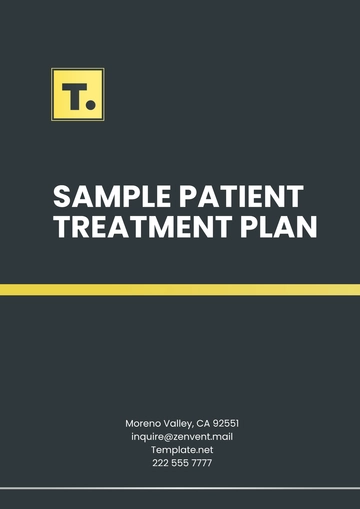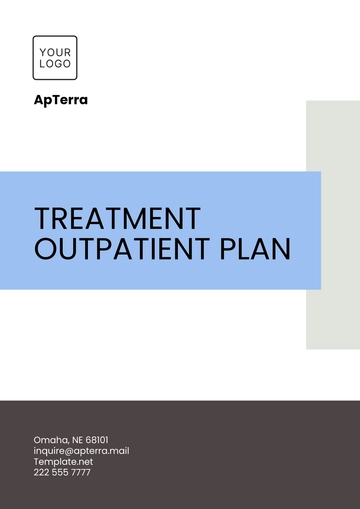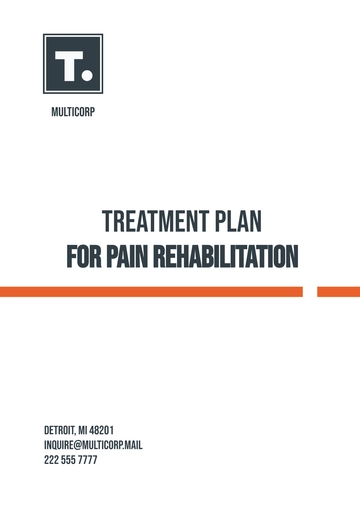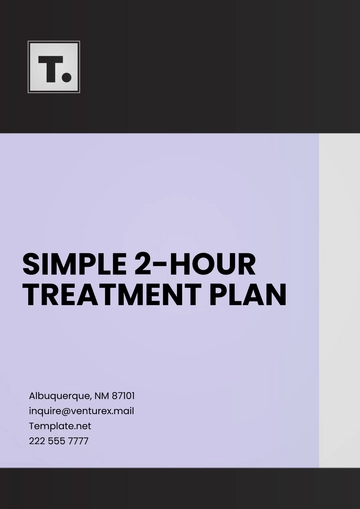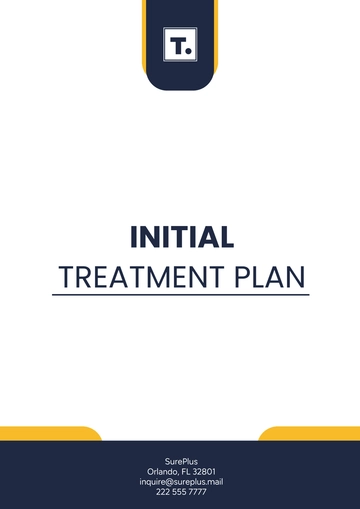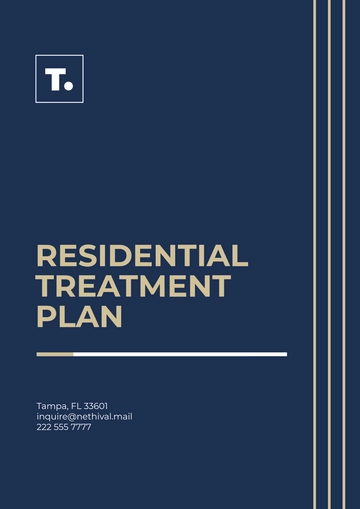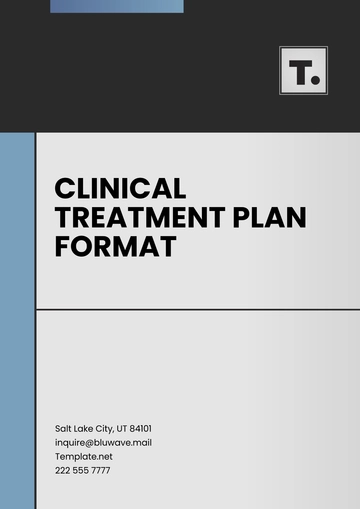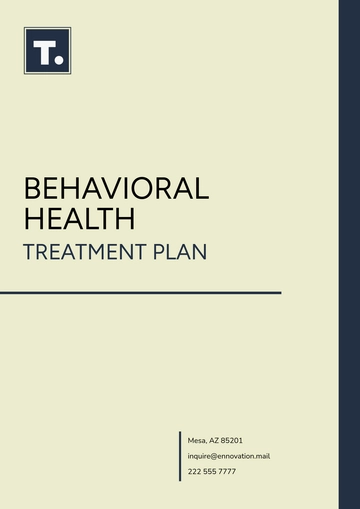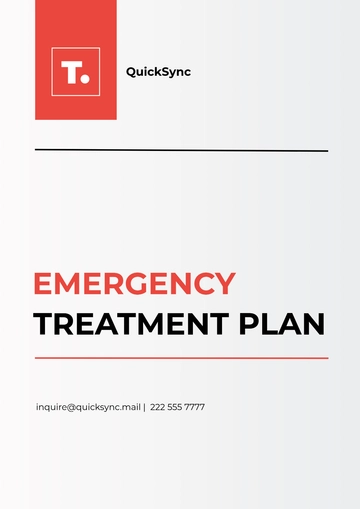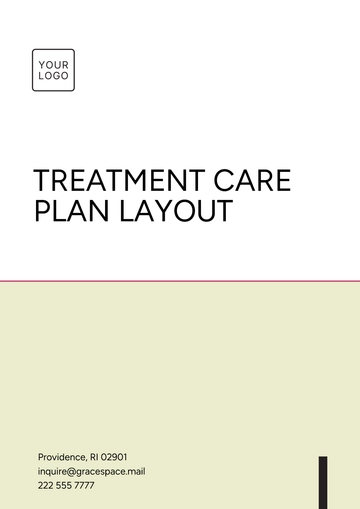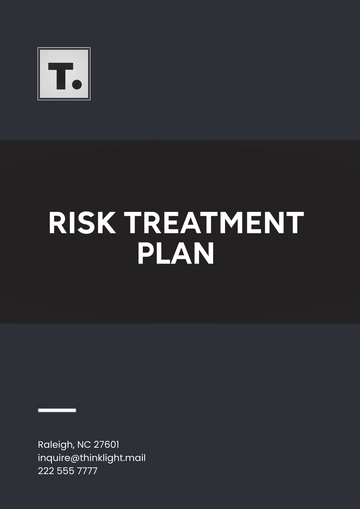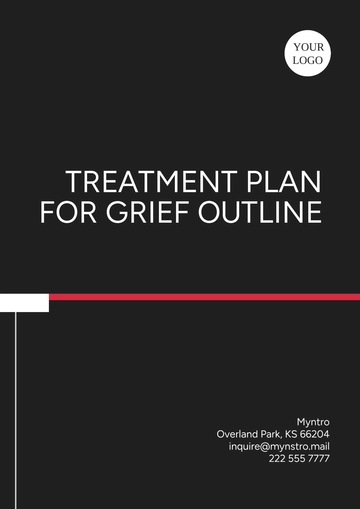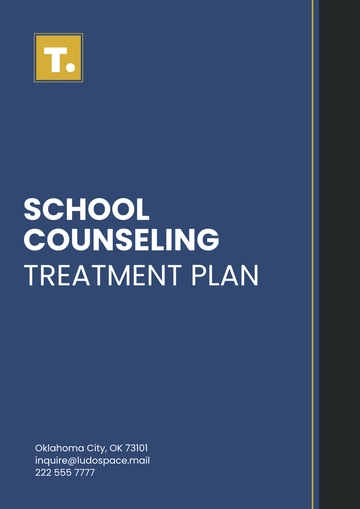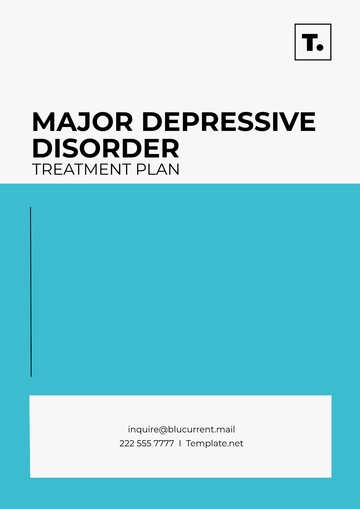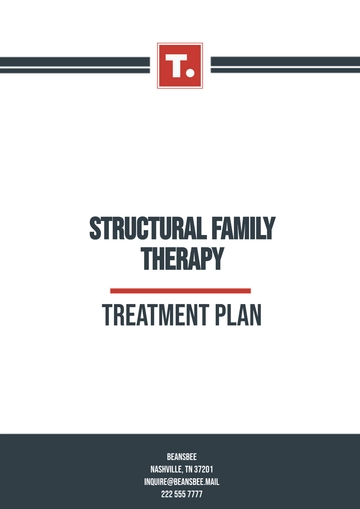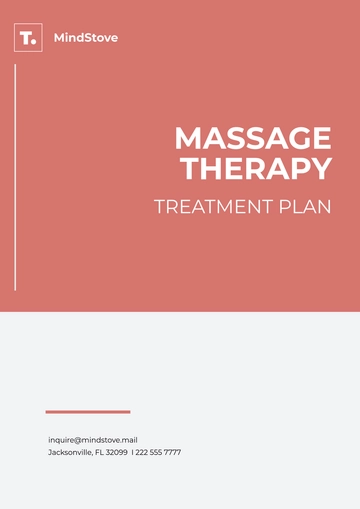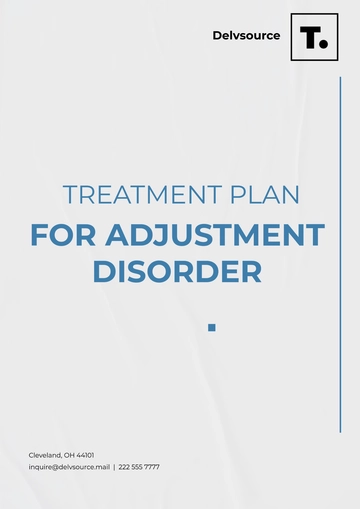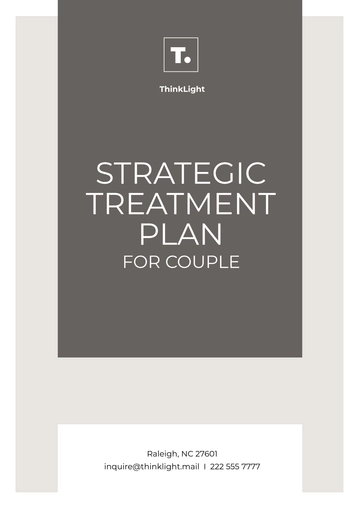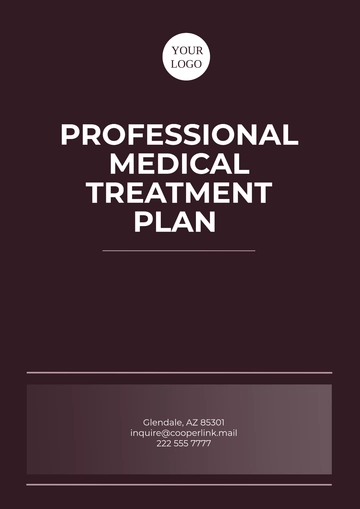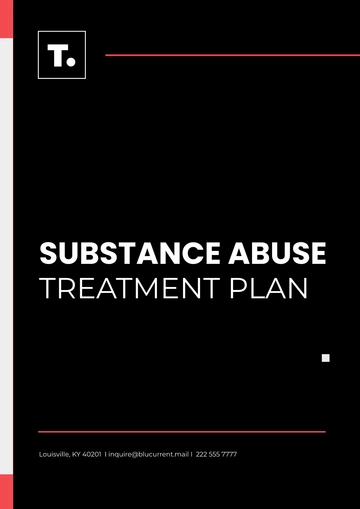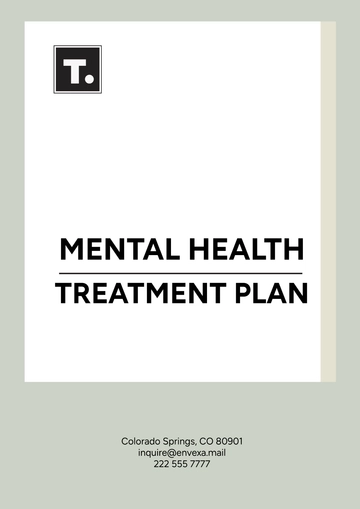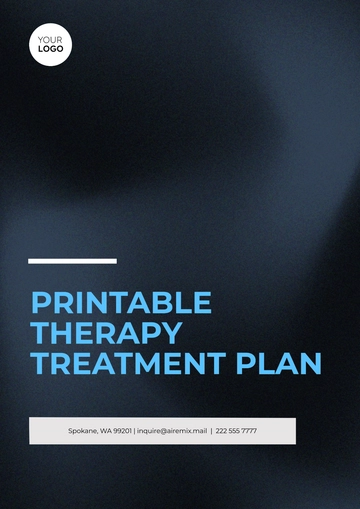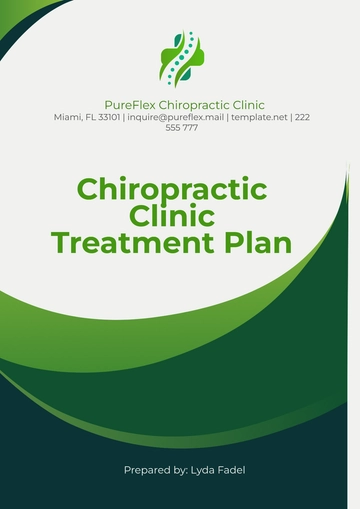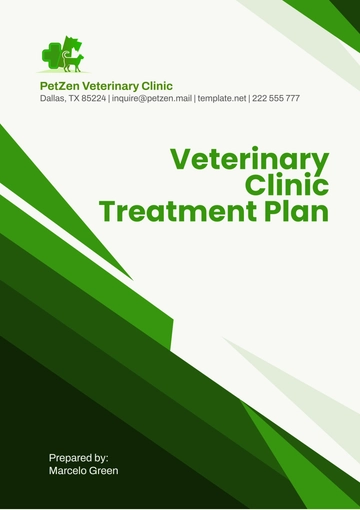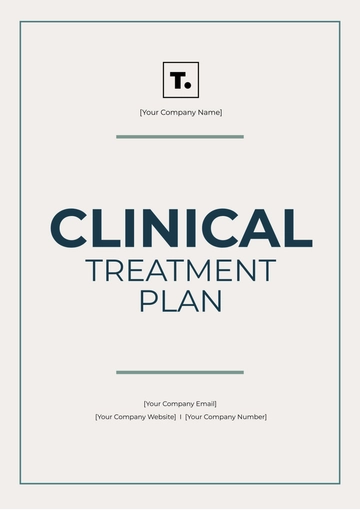Free Strategic Treatment Plan With Couple
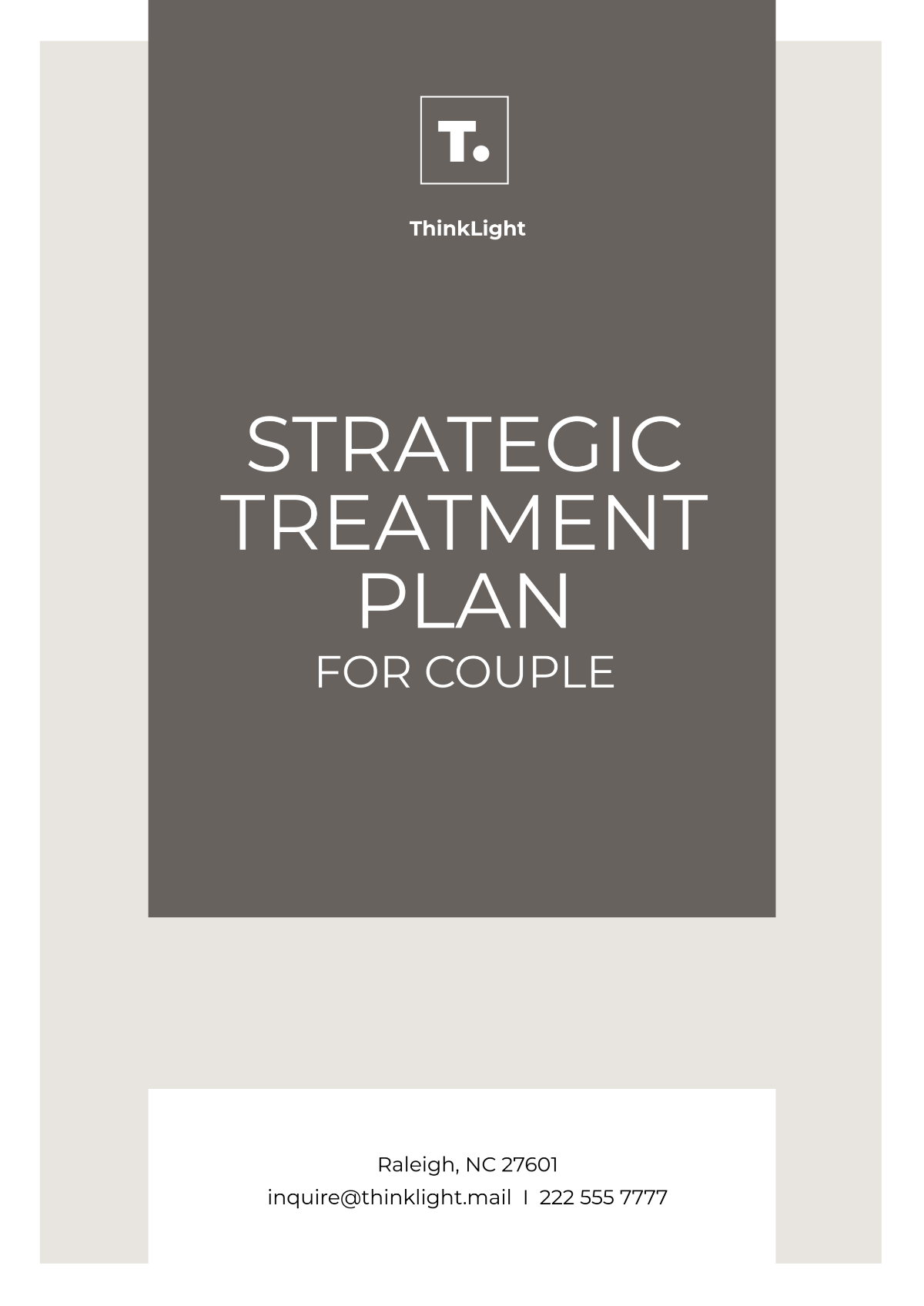
Prepared by: | [YOUR NAME] |
Date: | [DATE] |
I. Purpose and Objectives
This treatment plan is designed to offer a structured and strategic approach to addressing the issues faced by the couple. The goal is to improve their relationship by focusing on communication, conflict resolution, and emotional intimacy.
II. Key Objectives:
Improved communication between partners
Enhanced conflict resolution skills
Strengthened emotional intimacy
Develop strategies for long-term relationship stability
III. Assessment and Diagnosis
An in-depth assessment was conducted to understand the couple's relationship dynamics, individual backgrounds, and areas of conflict. The findings are summarized below:
IV. Assessment Summary:
Aspect | Findings |
|---|---|
Communication Patterns | Frequent misunderstandings and lack of active listening |
Conflict Resolution | Escalation of minor issues into major conflicts |
Emotional Intimacy | Feelings of emotional distance and unfulfilled emotional needs |
V. Goals and Interventions
The following goals and interventions have been identified for this treatment plan:
Goals:
Improve verbal and nonverbal communication skills
Develop effective conflict resolution techniques
Enhance emotional connection and understanding
Interventions:
Goal | Intervention |
|---|---|
Improve Communication | Weekly communication exercises and active listening drills |
Develop Conflict Resolution | Role-playing conflict scenarios and mediation sessions |
Enhance Emotional Intimacy | Joint activities and emotional check-in sessions |
VI. Timeline and Monitoring
Timeline:
The treatment plan will be executed over 12 months, beginning from January 1, 2050, to December 31, 2050.
Timeline | Activities |
|---|---|
January 1, 2050 - January 31, 2050 (Weeks 1-4) | Initial Assessment and Goal Setting: Conduct comprehensive individual and joint assessments to understand each partner's perspective and identify specific areas of conflict. Collaboratively establish therapeutic goals for the treatment period. |
February 1, 2050 - February 28, 2050 (Weeks 5-8) | Communication Skills Training: Begin structured exercises focused on enhancing communication skills. Practice active listening, assertiveness, and non-verbal communication techniques during therapy sessions and at home. |
March 1, 2050 - March 31, 2050 (Weeks 9-12) | Exploring Emotions and Triggers: Dive deeper into understanding underlying emotions driving conflicts. Explore past experiences and individual stressors contributing to misunderstandings within the relationship. |
April 1, 2050 - April 30, 2050 (Weeks 13-16) | Cognitive Restructuring: Introduce cognitive restructuring techniques to challenge negative thought patterns and assumptions. Develop cognitive reframing strategies to promote more adaptive responses to conflicts. |
May 1, 2050 - May 31, 2050 (Weeks 17-20) | Role-Playing Exercises: Engage in simulated scenarios to practice conflict resolution techniques in a controlled environment. Receive feedback and guidance from the therapist on effective communication strategies. |
June 1, 2050 - June 30, 2050 (Weeks 21-24) | Mindfulness and Emotional Regulation: Integrate mindfulness practices into daily routines to increase awareness of thoughts and emotions. Learn techniques for managing emotional reactivity during conflicts. |
July 1, 2050 - July 31, 2050 (Weeks 25-28) | Consolidation and Skill Reinforcement: Review progress made and reinforce newly acquired skills. Discuss any challenges encountered and strategies for overcoming them moving forward. |
August 1, 2050 - August 31, 2050 (Weeks 29-32) | Continued Practice and Application: Encourage ongoing application of communication and conflict resolution skills in real-life situations. Provide support and guidance as needed to navigate challenges. |
September 1, 2050 - September 30, 2050 (Weeks 33-36) | Review and Adjustment: Conduct a mid-point review to evaluate progress toward goals and identify areas for further improvement. Adjust intervention strategies as necessary based on feedback from both partners. |
October 1, 2050 - October 31, 2050 (Weeks 37-40) | Advanced Skill Development: Introduce advanced communication and conflict resolution techniques tailored to the specific needs and preferences of the couple. Focus on building resilience and flexibility in managing conflicts. |
November 1, 2050 - November 30, 2050 (Weeks 41-44) | Integration and Application: Facilitate the integration of learned skills into everyday interactions and decision-making processes. Encourage open dialogue and mutual support between partners. |
December 1, 2050 - December 31, 2050 (Weeks 45-48) | Review and Termination: Conduct a final review of progress made throughout the treatment period. Celebrate achievements and discuss strategies for maintaining positive changes beyond therapy. Schedule follow-up sessions as needed for ongoing support and reinforcement. |
Milestones:
Phase | Date | Milestone |
|---|---|---|
Initial Assessment | January 1, 2050 | Complete comprehensive assessment |
Mid-Phase Review | June 30, 2050 | Review progress and adjust interventions |
Final Review | December 31, 2050 | Evaluate outcomes and plan next steps |
VII. Conclusion
This strategic treatment plan is tailored to address the specific needs and dynamics of the couple. Continuous evaluation and adaptation of interventions are essential to ensure the best outcomes. Regular communication and engagement from both partners will be crucial for the success of this plan.
- 100% Customizable, free editor
- Access 1 Million+ Templates, photo’s & graphics
- Download or share as a template
- Click and replace photos, graphics, text, backgrounds
- Resize, crop, AI write & more
- Access advanced editor
Elevate your counseling sessions with our Strategic Treatment Plan With Couple from Template.net. This comprehensive resource offers an editable and customizable framework, meticulously designed to foster productive communication and resolution. Harness the power of our AI Editable Tool to tailor interventions, goals, and strategies, ensuring personalized and effective couples therapy. Reach new heights in relationship healing today.
You may also like
- Finance Plan
- Construction Plan
- Sales Plan
- Development Plan
- Career Plan
- Budget Plan
- HR Plan
- Education Plan
- Transition Plan
- Work Plan
- Training Plan
- Communication Plan
- Operation Plan
- Health And Safety Plan
- Strategy Plan
- Professional Development Plan
- Advertising Plan
- Risk Management Plan
- Restaurant Plan
- School Plan
- Nursing Home Patient Care Plan
- Nursing Care Plan
- Plan Event
- Startup Plan
- Social Media Plan
- Staffing Plan
- Annual Plan
- Content Plan
- Payment Plan
- Implementation Plan
- Hotel Plan
- Workout Plan
- Accounting Plan
- Campaign Plan
- Essay Plan
- 30 60 90 Day Plan
- Research Plan
- Recruitment Plan
- 90 Day Plan
- Quarterly Plan
- Emergency Plan
- 5 Year Plan
- Gym Plan
- Personal Plan
- IT and Software Plan
- Treatment Plan
- Real Estate Plan
- Law Firm Plan
- Healthcare Plan
- Improvement Plan
- Media Plan
- 5 Year Business Plan
- Learning Plan
- Marketing Campaign Plan
- Travel Agency Plan
- Cleaning Services Plan
- Interior Design Plan
- Performance Plan
- PR Plan
- Birth Plan
- Life Plan
- SEO Plan
- Disaster Recovery Plan
- Continuity Plan
- Launch Plan
- Legal Plan
- Behavior Plan
- Performance Improvement Plan
- Salon Plan
- Security Plan
- Security Management Plan
- Employee Development Plan
- Quality Plan
- Service Improvement Plan
- Growth Plan
- Incident Response Plan
- Basketball Plan
- Emergency Action Plan
- Product Launch Plan
- Spa Plan
- Employee Training Plan
- Data Analysis Plan
- Employee Action Plan
- Territory Plan
- Audit Plan
- Classroom Plan
- Activity Plan
- Parenting Plan
- Care Plan
- Project Execution Plan
- Exercise Plan
- Internship Plan
- Software Development Plan
- Continuous Improvement Plan
- Leave Plan
- 90 Day Sales Plan
- Advertising Agency Plan
- Employee Transition Plan
- Smart Action Plan
- Workplace Safety Plan
- Behavior Change Plan
- Contingency Plan
- Continuity of Operations Plan
- Health Plan
- Quality Control Plan
- Self Plan
- Sports Development Plan
- Change Management Plan
- Ecommerce Plan
- Personal Financial Plan
- Process Improvement Plan
- 30-60-90 Day Sales Plan
- Crisis Management Plan
- Engagement Plan
- Execution Plan
- Pandemic Plan
- Quality Assurance Plan
- Service Continuity Plan
- Agile Project Plan
- Fundraising Plan
- Job Transition Plan
- Asset Maintenance Plan
- Maintenance Plan
- Software Test Plan
- Staff Training and Development Plan
- 3 Year Plan
- Brand Activation Plan
- Release Plan
- Resource Plan
- Risk Mitigation Plan
- Teacher Plan
- 30 60 90 Day Plan for New Manager
- Food Safety Plan
- Food Truck Plan
- Hiring Plan
- Quality Management Plan
- Wellness Plan
- Behavior Intervention Plan
- Bonus Plan
- Investment Plan
- Maternity Leave Plan
- Pandemic Response Plan
- Succession Planning
- Coaching Plan
- Configuration Management Plan
- Remote Work Plan
- Self Care Plan
- Teaching Plan
- 100-Day Plan
- HACCP Plan
- Student Plan
- Sustainability Plan
- 30 60 90 Day Plan for Interview
- Access Plan
- Site Specific Safety Plan
